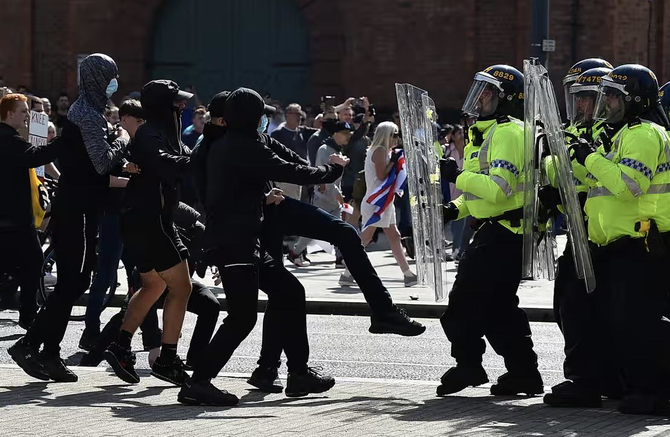LONDON: Police in the north of England town of Rotherham were struggling to hold back a mob of far-right activists Sunday who were seeking to break into a hotel believed to be housing asylum seekers, as the latest bout of rioting following a stabbing rampage at a dance class last week that left three girls dead and several wounded showed few signs of abating.
Footage from Sky News showed a line of police officers with shields facing a barrage of missiles as they sought to prevent the rioters from entering the Holiday Inn Express hotel. A small fire was also visible while windows in the hotel were smashed.
More demonstrations are expected to take place around the country, with many counter-demonstrators also set to make their presence felt.
On Saturday, far-right activists faced off with anti-racism protesters across the U.K., with violent scenes playing out in locations across the U.K., from Belfast, the capital of Northern Ireland, to Liverpool in the northwest of England and Bristol in the west. Further arrests are likely as police scour CCTV, social media and body-worn camera footage.
In just one incident on Saturday, Merseyside Police said about 300 people were involved in violent disorder in Liverpool, which saw a community facility set on fire. The Spellow Lane Library Hub, which was opened last year to provide support for one of the most deprived communities in the country, suffered severe damage to the ground floor. Police said rioters tried to prevent firefighters from accessing the fire, throwing a missile at the fire engine and breaking the rear window of the cab.
Police have also warned that widespread security measures, with thousands of officers deployed, mean that other crimes may not be investigated fully.
“We’re seeing officers that are being pulled from day-to-day policing," Tiffany Lynch from the Police Federation of England and Wales told the BBC. “But while that’s happening, the communities that are out there that are having incidents against them — victims of crime — unfortunately, their crimes are not being investigated.”
The violence erupted earlier this week, ostensibly in protest of Monday’s stabbing attack in Southport. A 17-year-old male has been arrested.
False rumors spread online that the young man was a Muslim and an immigrant, fueling anger among far-right supporters,. Suspects under 18 are usually not named in the U.K., but Judge Andrew Menary ordered Axel Rudakubana, born in Wales to Rwandan parents, to be identified, in part to stop the spread of misinformation. Rudakubana has been charged with three counts of murder, and 10 counts of attempted murder.
Police said many of the actions are being organized online by shadowy far-right groups, who are mobilizing support online with phrases like “enough is enough,” “save our kids” and “stop the boats.” They are tapping into concerns about the scale of immigration in the country, in particular the tens of thousands of migrants arriving in small boats from France across the English Channel.
Calls for protests have come from a diffuse group of social media accounts, but a key player in amplifying them is Stephen Yaxley-Lennon, a longtime far-right agitator who uses the name Tommy Robinson. He led the English Defense League, which Merseyside Police has linked to the violent protest in Southport on Tuesday, a day after the stabbing attack.
The group first appeared around 2009, leading a series of protests against what it described as militant Islam that often devolved into violence. Yaxley-Lennon was banned from Twitter in 2018 but allowed back after it was bought by Elon Musk and rebranded as X. He has more than 800,000 followers.
The group’s membership and impact declined after a few years, and Yaxley-Lennon, 41, has faced myriad legal issues. He has been jailed for assault, contempt of court and mortgage fraud and currently faces an arrest warrant after leaving the U.K. last week before a scheduled hearing in contempt-of-court proceedings against him.
Nigel Farage, who was elected to parliament in July for the first time as leader of Reform U.K., has also been blamed by many for encouraging — indirectly — the anti-immigration sentiment that has been evident over the past few days. While condemning the violence, he has criticized the government for blaming it on “a few far-right thugs” and saying “the far right is a reaction to fear … shared by tens of millions of people.”
Far-right demonstrators have held several violent gatherings since the stabbing attack, clashing with police Tuesday outside a mosque in Southport — near the scene of the stabbing — and hurling beer cans, bottles and flares near the prime minister’s office in London the next day. Many in Southport have expressed their anger at the organized acts of violence in the wake of the tragedy.
Britain’s new prime minister, Keir Starmer, has blamed the violence on “far-right hatred” and vowed to end the mayhem. He said police across the U.K. would be given more resources to stop “a breakdown in law and order on our streets.”
Policing minister Diana Johnson told the BBC that there is “no need” to bring in the army to help police in their efforts to confront the violence.
“The police have made it very clear that they have all the resources they need at the moment," she said.
















